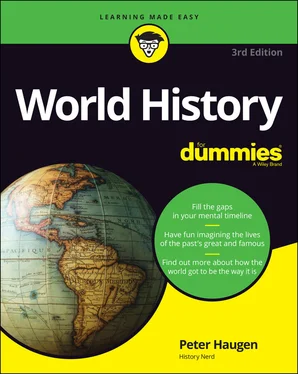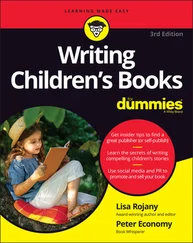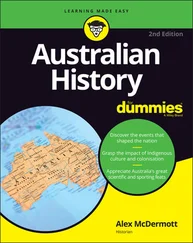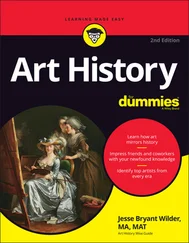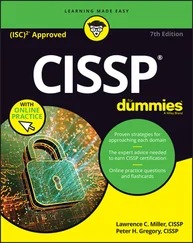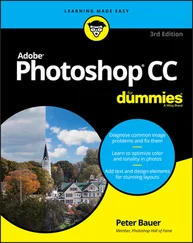Peter Haugen - World History For Dummies
Здесь есть возможность читать онлайн «Peter Haugen - World History For Dummies» — ознакомительный отрывок электронной книги совершенно бесплатно, а после прочтения отрывка купить полную версию. В некоторых случаях можно слушать аудио, скачать через торрент в формате fb2 и присутствует краткое содержание. Жанр: unrecognised, на английском языке. Описание произведения, (предисловие) а так же отзывы посетителей доступны на портале библиотеки ЛибКат.
- Название:World History For Dummies
- Автор:
- Жанр:
- Год:неизвестен
- ISBN:нет данных
- Рейтинг книги:3 / 5. Голосов: 1
-
Избранное:Добавить в избранное
- Отзывы:
-
Ваша оценка:
- 60
- 1
- 2
- 3
- 4
- 5
World History For Dummies: краткое содержание, описание и аннотация
Предлагаем к чтению аннотацию, описание, краткое содержание или предисловие (зависит от того, что написал сам автор книги «World History For Dummies»). Если вы не нашли необходимую информацию о книге — напишите в комментариях, мы постараемся отыскать её.
World History For Dummies,
For Dummies
World History For Dummies
World History For Dummies — читать онлайн ознакомительный отрывок
Ниже представлен текст книги, разбитый по страницам. Система сохранения места последней прочитанной страницы, позволяет с удобством читать онлайн бесплатно книгу «World History For Dummies», без необходимости каждый раз заново искать на чём Вы остановились. Поставьте закладку, и сможете в любой момент перейти на страницу, на которой закончили чтение.
Интервал:
Закладка:
In this book, you can assume that a four-digit year without two capital letters following it is AD. So, I may tell you that William the Conqueror, who ruled the kingdom of Normandy, successfully invaded England in 1066. For the years 1–999 AD, I use AD — for example, Norsemen invaded Ireland and began building the city of Dublin around 831 AD. I also include the initials for all the BC years. Examples: Saul was anointed the first king of the Israelites in about 1050 BC, and Julius Caesar was murdered in 44 BC, the year before the calendar named for him took effect. (The reason why I say around and about for the dates of Dublin’s founding and King Saul’s coronation is that nobody knows the dates for sure.)
Another thing that may be confusing is the way centuries are named and numbered. When you see a reference to the 1900s, it doesn’t mean the same thing as the 19th century. The 1900s are the 20th century. The 20th century was the one in which four-digit year numbers started with 19; the 19th century was the one in which years started with 18, and so on.
You may wonder why this century, the one with 20 starting every year, isn’t called the 20th. That’s because theoretically, the first century (according to Pope Gregory and his advisers, anyway) began in the year 1. When the numbers got up to 100 (or, technically, 101), we were in the second century, and so on. Figuring the centuries BC works the same way (in reverse, of course): The 21st century BC is the one with years starting with 20, just like the 21st century AD.
Dividing Time into Eras … and Giving Them Names
If history teachers told you that medieval means the period between the fall of Rome (476 AD) and the Renaissance (the 14th century), you could have thrown the author H.G. Wells at them.
Not literally, of course. (Let Mr. Wells rest in peace.) Yet it may surprise students of history and certain teachers to find out that historians disagree about when the period called medieval began. Wells (1866–1946) is better remembered today as a pioneering science-fiction writer, author of The Time Machine and War of the Worlds (1898), but he also wrote a three-volume Outline of History (1920). He begins the second volume of this major history of the world, called Medieval History , at 300 BC with the rise, not the fall, of Rome’s empire.
So what? That’s my point. Wells’s work is just one illustration of the fact that history is full of periods divided by arbitrary lines etched in the shifting sands of time.
 Historians have points of view. The good ones have really well-informed points of view, but they don’t all march in intellectual lockstep.
Historians have points of view. The good ones have really well-informed points of view, but they don’t all march in intellectual lockstep.
Sorting ancient from modern
“That’s ancient history, Pops.” In American movies from the 1930s through the 1950s, a teenage character often says something like that to an adult, thus dismissing an event that the adult remembers as being too long ago to matter. Ancient is another relative term, like recent, modern, and medieval. To a person born in 2021, the teenager in that 1950s movie will seem beyond ancient.
 In history, ancient has more specific meanings. Wells defined it as “From the World Before Man to the Rise of the Roman Empire,” and he considered the modern period to have begun in 1567.
In history, ancient has more specific meanings. Wells defined it as “From the World Before Man to the Rise of the Roman Empire,” and he considered the modern period to have begun in 1567.
Telling classical from schmassical
Classical is another historical label that can have different meanings in different contexts. The classical period in European music, for example, was about 1750 to 1820, but people who study the Maya civilization of the Yucatan Peninsula refer to a classical historical period of about 250–900 AD.
One of the best-known uses of the term classical applies to the years 479–323 BC in the southern Balkan Peninsula of Eastern Europe. That period was a particularly influential era of Greek culture: Classical Greece (with a capital C ).
Traditionally, many historians have hailed the Classical Greeks as being the founders of Western civilization’s core values: rationality, freedom of debate, individuality, and democracy. These concepts did arise and gain acceptance during that time, yet the Greece of the time was hardly an ideal society. Greek cities often fought wars against one another, and in addition to creating enduring ideas, they hatched some notions that sound quite peculiar today. In Aristotle’s time (the fourth century BC), for example, one could argue that women were “failed men,” a lesser rendering of the same biological pattern as males. Yikes!
The Greek city–state Athens is often cited as a model for modern democracies, but there are huge differences between the Greeks’ notion of democracy and today’s. In Athens, maybe 30 percent of the population at most were citizens, and all citizens were men.
Historians constantly reevaluate the past. As scholars reinterpret the period, the term Classical may no longer be helpful for understanding the years 479–323 BC in Greece. And you know what? That’s okay. You can look at the Greeks from any number of angles, and they don’t get any less fascinating.
 As H.G. Wells said of history, “The subject is so splendid a one that no possible treatment … can rob it altogether of its sweeping greatness and dignity.”
As H.G. Wells said of history, “The subject is so splendid a one that no possible treatment … can rob it altogether of its sweeping greatness and dignity.”
Bowing to the queens
Scholars also name eras and periods for notable events or people, such as Columbus’s arrival in the Americas. In the Western Hemisphere, times before that event are frequently called pre-Columbian. A period label is often based on the reign of a monarch, such as England’s Elizabeth I (before there was a United Kingdom). Events, fashions, and literature from her reign (1558–1603, a golden age of English culture) carry the designation Elizabethan. A label may cover much longer periods, as when they derive from Chinese dynasties. The Ming Dynasty, for example, ruled from 1368–1644.
For a cinematic depiction of England’s Elizabethan era, you can check out 1998’s Elizabeth and its 2007 sequel, Elizabeth: The Golden Age , both starring Cate Blanchett. The movies take liberties with the historical truth (as do all movies based on history), but they also give a vivid visual sense of England in the 16th century. A British “docudrama” miniseries from 2017 titled Elizabeth I makes an earnest effort to stay factual.
As with so many of the terms discussed in this chapter, the names of historical periods can lose their meaning with the passage of time. I was born and grew up in the postwar era, but as World War II fades into history and as more recent wars erupt, the term postwar is less widely understood. (“Which war are you talking about, Pops?”) Also, some labels can seem more arbitrary than others. Only 16th-century England under the reign of Elizabeth I wears the tag Elizabethan, for example. Elizabethan doesn’t describe the worlds of late-16th-century China (Ming) or late-16th-century Peru (ruled by the Spanish). Yet Victorian, a term for the period 1837–1901, when Victoria was queen and empress of Britain’s vast colonial holdings, applies well outside her sphere, especially to styles and cultural attitudes. Victoria never ruled California, for example, but San Francisco is recognized for its Victorian architecture.
Читать дальшеИнтервал:
Закладка:
Похожие книги на «World History For Dummies»
Представляем Вашему вниманию похожие книги на «World History For Dummies» списком для выбора. Мы отобрали схожую по названию и смыслу литературу в надежде предоставить читателям больше вариантов отыскать новые, интересные, ещё непрочитанные произведения.
Обсуждение, отзывы о книге «World History For Dummies» и просто собственные мнения читателей. Оставьте ваши комментарии, напишите, что Вы думаете о произведении, его смысле или главных героях. Укажите что конкретно понравилось, а что нет, и почему Вы так считаете.
